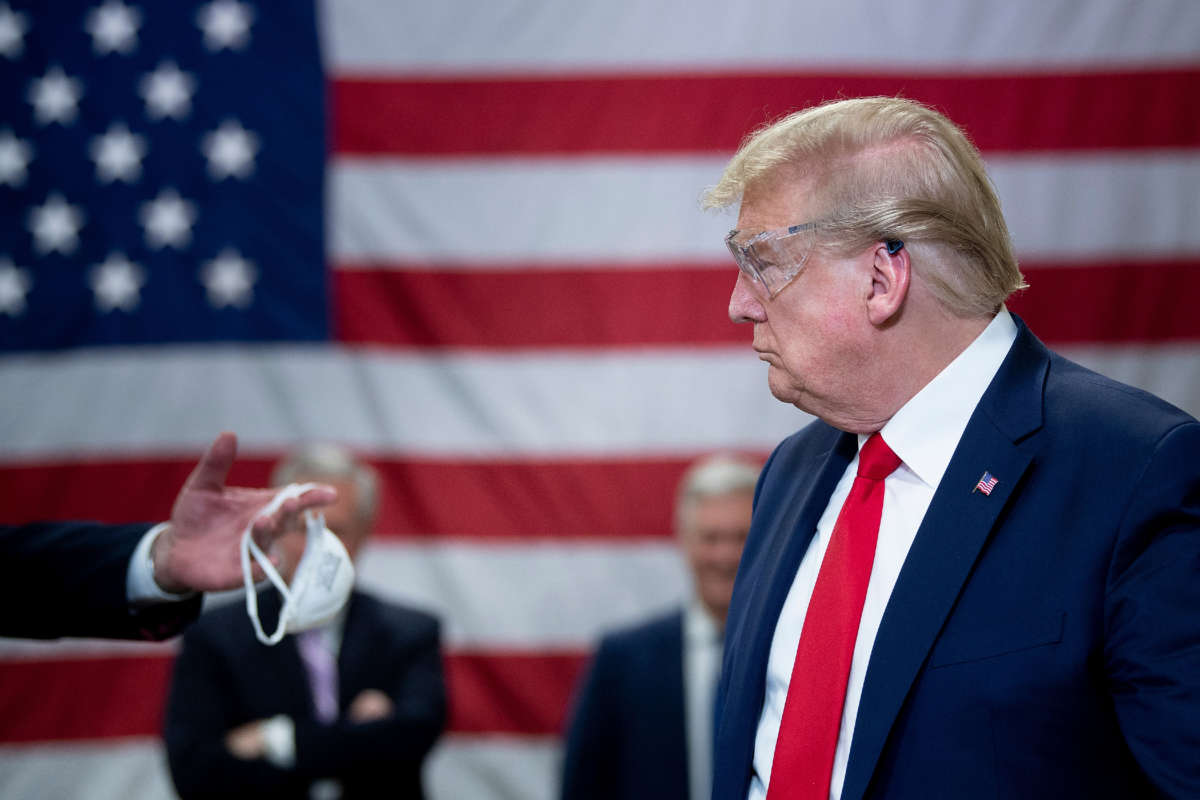In spite of many Republicans being ardently against mask mandates, both nationally or at the state level, the Republican National Convention slated to take place in Charlotte, North Carolina, later this month will now require all participants to wear facial coverings during its events.
The announcement made on Tuesday is the latest example in how Republicans and Democrats will conduct their respective parties’ conventions amid the coronavirus pandemic.
In addition to the mask requirement, the Republican convention will have everyone involved wearing Bluetooth technology for contact tracing purposes. If a participant falls sick after the convention, data from the bluetooth device embedded in the badges convention attendees are required to wear can help track all the people who were in close proximity to that person.
“It knows when other badges are close to it, and how long they are close to it, and the identity of who is wearing it is in a database,” convention health consultant Jeffrey Runge told NPR. He added that the badges were secure devices.
“No one will ever crack that code, unless somebody gets sick,” he said.
The Republican National Convention will reportedly be “business-only,” with only 336 delegates set to be in attendance. The convention will take place from August 24 to the 27, with President Donald Trump accepting the party’s nomination on the final day.
A lot of items pertaining to the convention remain unknown at this time, however — including where, exactly, Trump will be giving his nomination address. After North Carolina Gov. Roy Cooper, a Democrat, said that it’d be impossible to hold the convention as planned due to coronavirus concerns, Trump threatened to move the event to Jacksonville, Florida. But that state has seen huge increases in the number of COVID cases in recent weeks, prompting Trump to cancel those plans.
Trump has now toyed with the idea of giving his nomination acceptance speech at Gettysburg in Pennsylvania, or even at the White House itself, both locations that could run afoul of the Hatch Act, the law that prevents government workers from using government resources for political purposes. Trump is technically exempt from the law, but park rangers at Gettysburg and White House staffers could face penalties if the political events are held at either location.
Democrats, meanwhile, are planning a convention that will likely look a lot different from what Republicans are doing. Originally, the Democratic National Convention was set to take place in Milwaukee, Wisconsin, in July. But due to the pandemic, they initially delayed their convention until August, and now the event is set to be almost completely virtual, with Milwaukee serving as the “anchor” city for the convention while speakers will be located throughout the country.
Unlike Republicans, Democratic state delegations will not travel to the host city. Instead, they will conduct business — including the official nomination of Joe Biden as the party’s candidate for president — remotely, during the week of August 17-20.
Biden himself will not give any speeches at the convention site. Instead, his acceptance speech will be given in his home state of Delaware. Other speakers scheduled for the event will similarly speak from different locations throughout the U.S.
Of course, there is still time between now and when each of the major parties’ respective conventions will occur for things to change. The biggest things to pay attention to at this moment may be where Trump and the Republicans will choose as the appropriate location for him to accept the nomination. As for who will be Biden’s pick for vice president, that choice was made earlier today: Sen. Kamala Harris of California.
Thank you for reading Truthout. Before you leave, we must appeal for your support.
Truthout is unlike most news publications; we’re nonprofit, independent, and free of corporate funding. Because of this, we can publish the boldly honest journalism you see from us – stories about and by grassroots activists, reports from the frontlines of social movements, and unapologetic critiques of the systemic forces that shape all of our lives.
Monied interests prevent other publications from confronting the worst injustices in our world. But Truthout remains a haven for transformative journalism in pursuit of justice.
We simply cannot do this without support from our readers. At this time, we’re appealing to add 50 monthly donors in the next 2 days. If you can, please make a tax-deductible one-time or monthly gift today.
